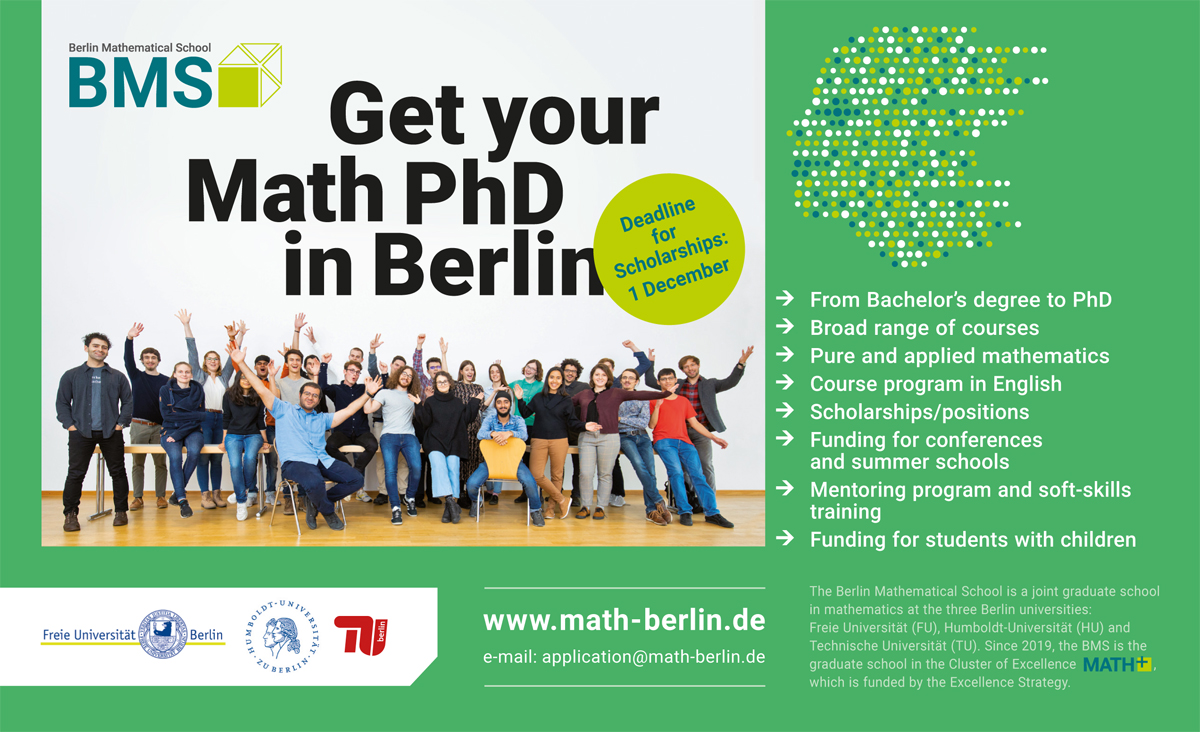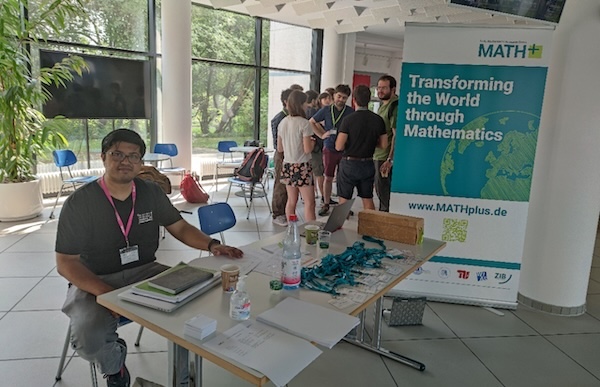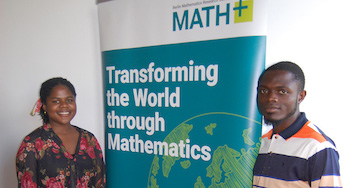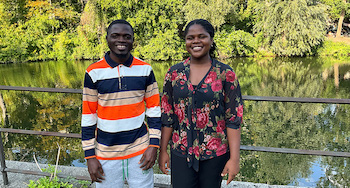
|
Call for applications to the PhD program 2024The Berlin Mathematical School offers a doctoral program in the rapidly developing scientific landscape of Berlin presenting an exciting variety of possibilities both for mathematical research and graduate education. As a BMS student, you will join a diverse community of fellow graduate students coming from about 50 countries around the world of which 30% are women.
We are now accepting applications for admission from talented students completing their Bachelor's degree or above. Application deadlines For detailed information, please go to: Application Podcast about Africa with Marwa Zainelabdeen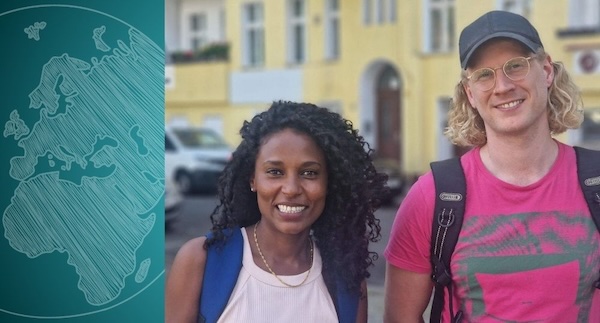 . © Kevin Caners . © Kevin Caners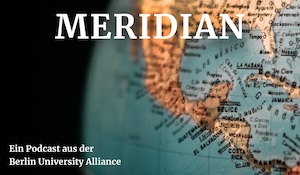 MATH+ has established ties with African institutions, such as the African Institute of Mathematical Sciences (AIMS), and is a member of the Young African Mathematicians (YAM) Fellowship Program which supports young African mathematicians studying in Germany. This program was initiated by the Hausdorff Center for Mathematics in Bonn and is a collaboration between five AIMS centers in Cameroon, Senegal, Rwanda, Ghana, and South Africa, and four German Clusters of Excellence focused on mathematics. The YAM program’s mission is to provide fellowships for talented and motivated young African mathematicians at the master’s level, allowing them to spend nine months studying at one of the four German mathematical excellence clusters in Berlin, Bonn, Heidelberg, or Münster. Marwa Zainelabdeen is a MATH+/BMS doctoral student at the Weierstrass Institute for Applied Analysis and Stochastics (WIAS) and Freie Universität Berlin and a lecturer at the University of Khartoum, Sudan. Dominic Bunnett is a postdoc at TU Berlin working in algebraic geometry and a member of the program committee for the Young African Mathematicians (YAM)program of MATH+. BMS Certificate Ceremony & MATH+ Dissertation AwardsThe afternoon started at 13:00 with the BMS PhD seminar “What are… gradient flows and optimal transport for machine learning and optimization?“ in which Dr. Jai-Jie Zhu introduced the topic of the following MATH+ Friday Colloquium on “Particle Methods in Machine Learning and Inverse Problems,” held by Martin Burger, a lead scientist at DESY and full professor at Universität Hamburg. 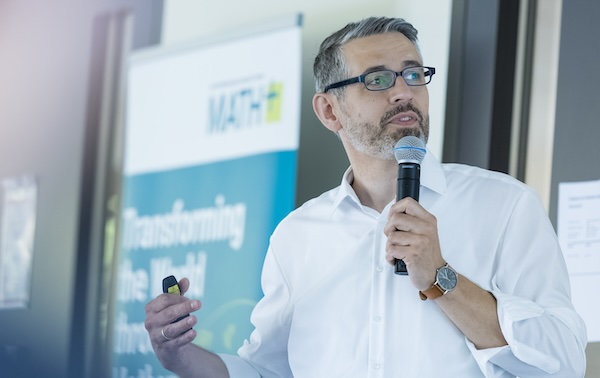 At 16:00, MATH+ Chair Michael Hintermüller welcomed everyone to the Certificate Ceremony and gave a laudation for the MATH+ Dissertation Award winners of 2023, a prize first initiated in 2020. In cooperation with the Einstein Foundation Berlin, the Berlin Mathematical School (BMS) of the Cluster of Excellence MATH+ awards up to three annual prizes for outstanding dissertations to BMS graduates. The MATH+ Dissertation Award 2023 was presented to Viorel Andrei Bud, Toyomu Matsuda, and Arturo Merino for their excellent theses. Congratulations to all of them! Arturo Merino was there to proudly receive his Dissertation Award certificate. Unfortunately, Viorel Andrei Bud and Toyomu Matsuda couldn’t participate in the ceremony as they already started their Postdocs in Frankfurt and Lausanne, respectively. 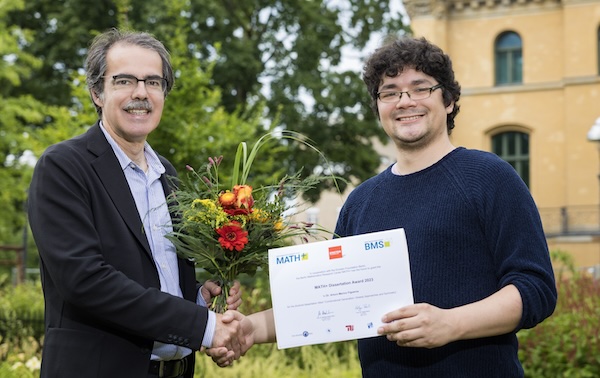 Michael Hintermüller continued and honored our two fellows of the Young African Mathematician (YAM) Fellowship Program, Wilson Tsuata and Samantha Glory Guiate Simo, both from Cameroon. They are the first fellows to complete the program within MATH+ and will go on to PhD positions this fall. 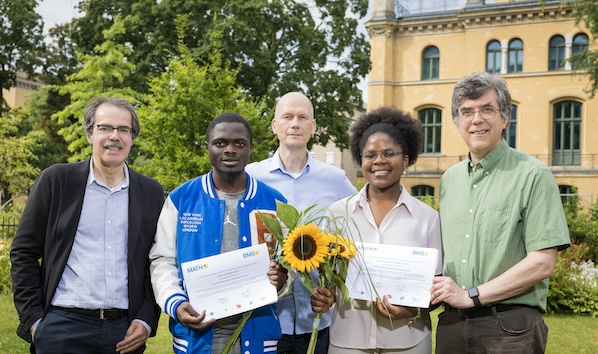 Afterwards, BMS Chair Holger Reich announced this year’s Phase I graduates, followed by BMS Co-Chair John M. Sullivan’s laudation for the Phase II graduates. 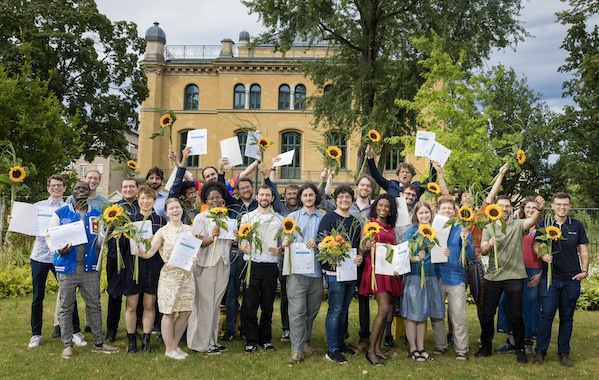 Between the certificate presentations, a cello quartet led by MATH+ Co-Chair Martin Skutella played and thus provided a festive and beautiful atmosphere. 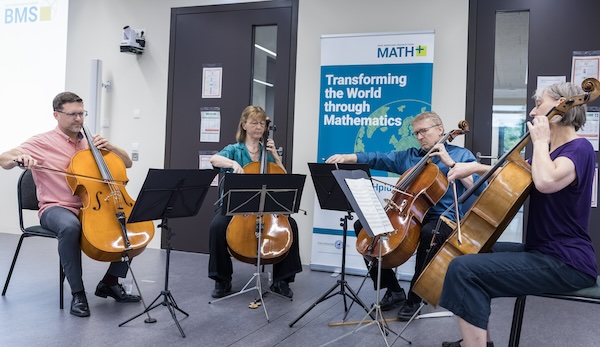 Bright sunflowers, which were presented along with the certificates, created a sunny atmosphere. Photos were taken with happy, laughing BMS alumni in groups, with their supervisors, and with their loved ones. The evening closed with a lively reception and summer party that was the perfect opportunity to meet everyone, talk about science, and exchange memories with the graduates and the entire MATH+ community. Photos: © Kay Herschelmann / BMS BMS-BGSMath Junior Meeting in Berlin 2024 at ZIBThis year’s BMS-BGSMath Junior Meeting took place in Berlin from 26-28 June at the Zuse Institute (ZIB) with 36 participants. BMS Chair Holger Reich welcomed everyone on behalf of BMS and MATH+. The Berlin Mathematical School (BMS) and the Barcelona Graduate School of Mathematics (BGSMath) alternate in organizing regular meetings to share their ambitions for excellent doctoral and postdoctoral training programs. The Plenary Talks were presented by María Ángeles García Ferrero (Instituto de Ciencias Matemáticas/ICMAT) on Partial Differential Equations, Frank Trujillo (Centre de Recerca Matemàtica/CRM) on Dynamical Systems, Thibaut Mazuir (HU Berlin) on Symplectic Geometry and Homotopical Algebra, and Giulia Codenotti (FU Berlin) on Discrete Geometry. YAM Network Meeting in Münster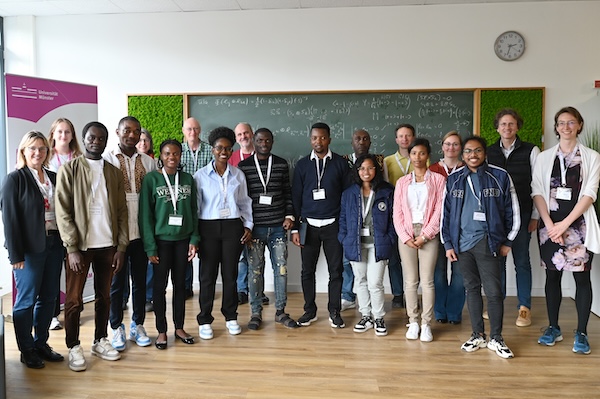 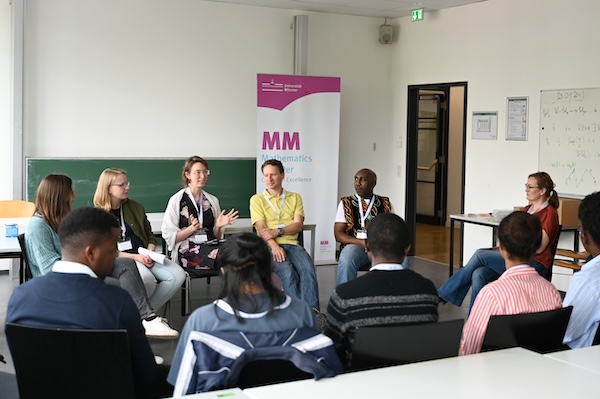 MATH+ YAM Fellow Wilson Tsuata from Berlin attended the network meeting in Münster, accompanied by Hannah Rohwer from the MATH+ office. Unfortunately, the second MATH+ YAM Fellow Samantha Glory Guiate Simo could not participate due to a conference. In September 2023, MATH+ and the BMS welcomed Samantha Glory Guiate Simo and Wilson Tsuata as the first MATH+ YAM Fellows of the Young African Mathematicians (YAM) Fellowship Program for the academic year 2023/24. As YAM fellows, both are also part of the Berlin Mathematical School (BMS) for the duration of the YAM program. 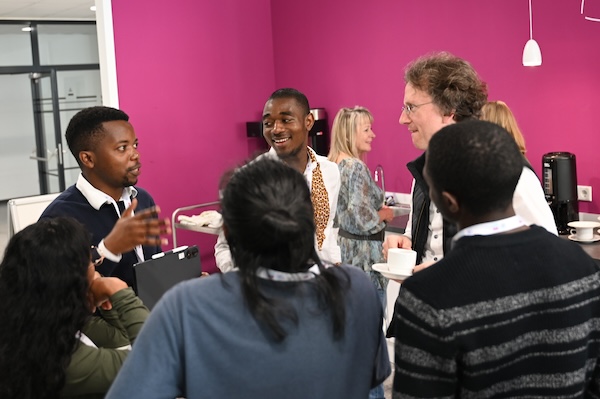 In Münster, the YAM fellows reflected on their experiences and looked ahead after a joint lunch at the Münster Mensa,. They shared their personal and academic learnings from their time in Germany through presentations. A panel discussion followed, featuring Prof. Dr. Franca Hoffmann, initiator of the YAM program, Prof. Dr. Raimar Wulkenhaar, Dr. Fridolin Melong, AIMS-DFG fellow at Mathematics Münster, Prof. Dr. Anna Gusakova, and Dr. Kristina Wensing, who provided tips, advice, and insights into (academic) careers in and outside Germany. The discussion was moderated by Dr. Imke Franzmeier. 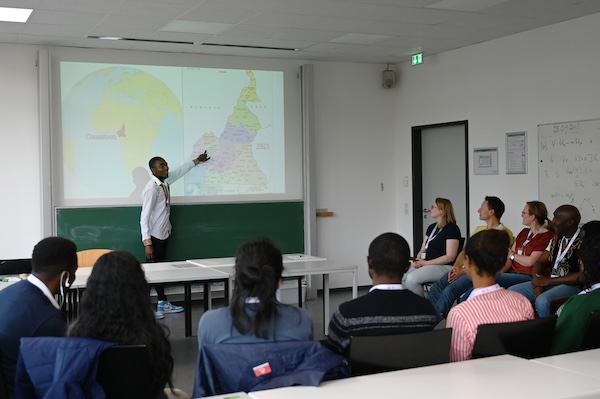 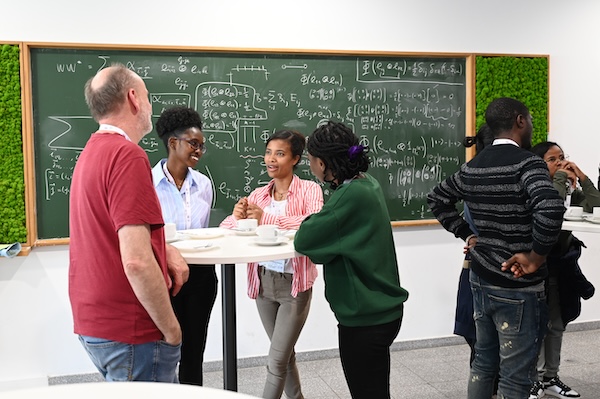 Photos: © Mathematik Münster
After a feedback session, everyone gathered for dinner at "Das Blaue Haus," a well-known student pub in Münster. DFG Approved Two RTG (PhD) Led by MATH+ Scientists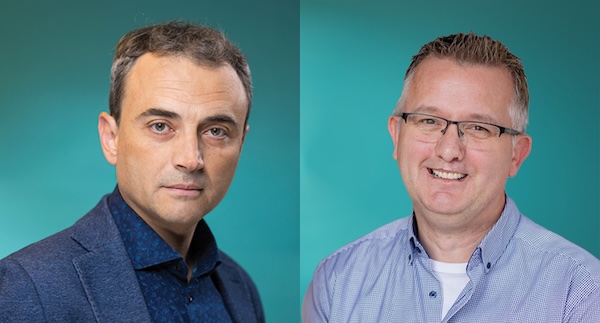 Gavril Farkas (left) © Kay Herschelmann | Peter Bank © Felix Noak The new Research Training Group (RTG 2965) in algebraic geometry “From geometry to numbers: Moduli, Hodge theory, rational points” The new RTG is jointly run by the Leibniz Universität Hannover and the Humboldt-Universität zu Berlin. Stefan Schreieder from Hannover is the spokesperson of the RTG, and Gavril Farkas, Berlin Mathematical School’s co-chair and MATH+ Distinguished Fellow from the Humboldt-Universität zu Berlin, is the co-spokesperson. Apart from Gavril Farkas, the Humboldt-Universität is represented in the RTG with another four PIs, also all MATH+ members, namely Gaetan Borot, Bruno Klingler (also MATH+ Distinguished Fellow), Thomas Krämer, and Angela Ortega. The PhD training in the RTG will run from 01 October 2024 until 30 September 2029, and the DFG will fund 20 PhD positions each for a duration of four years, distributed evenly between the two participating universities. The guiding principle of the RTG is the interplay between geometry and numbers. A first manifestation of this idea is the fact that geometric objects can be assigned algebraic invariants and, in particular, numbers, which often play an important role in classification. Examples are given by Hodge numbers, by intersection numbers on moduli spaces, or by the number of rational points. The research program rests on three main pillars for which the groups in Berlin and Hannover are world experts: • Hodge theory and topology of algebraic varieties; • Geometry and combinatorics of moduli; • Arithmetic of moduli and rational points. The International Research Training Group Berlin-Oxford (IRTG 2544) „Stochastic Analysis in Interaction“ enters its second stage of funding The IRTG is jointly operated by Technische Universität Berlin and the University of Oxford, led by MATH+ member Peter Bank from Berlin and Terry Lyons from Oxford. The further funding means that the successful collaboration between Berlin and Oxford in this mathematical field over the past four and a half years will continue. In particular, it enables PhD students from Berlin and Oxford to visit each other’s institution for months at a time. This IRTG will receive over four million euros in funding from the German Research Foundation (DFG) for another four and a half years. Since April 2020, the PhD students of the international graduate school "Stochastic Analysis in Interaction" have been investigating mathematical questions concerning random systems, as they appear in many models of biology, physics, or finance. "Our graduates from the first phase of funding have, for example, contributed to the mathematical foundations of a better understanding of Bose-Einstein condensation and have also developed numerical methods for dealing with very current models for fluctuations in financial markets," says Peter Bank, who heads the field of financial mathematics at TU Berlin. "But also, at least at first glance, purely mathematical contributions to the integration theory of rough paths have been made and have even been awarded with one of the doctoral prizes of the Excellence Cluster MATH+," he adds. The second funding period will allow the current PhD students, as well as those of a third doctoral group, to complete an equally varied and in-depth training and research program. "We can now follow up on the 14 workshops, the more than 80 lectures given by invited researchers from all over the world, the mini-courses, and the Berlin-Oxford summer schools from the first funding phase with further highlights," says Peter Bank, adding: "And our PhD students will continue to gain international experience. They have already been a flagship of the Berlin research landscape, having held over 200 presentations internationally." (Source IRTG: TU Berlin Press Release, in German) --- Research Training Groups (RTG), funded by the German Research Foundation (DFG) RTG are established by universities to support the development of early career researchers. The groups receive funding from the DFG for a maximum of nine years. Their primary focus lies on the qualification of doctoral researchers within the framework of a focused research program and a structured training framework. Research Training Groups that embrace interdisciplinary collaboration are highly encouraged. The objective is to equip doctoral candidates with the skills to navigate the complexities of the science and academic job markets while fostering their early scientific independence. BMS PhD Student Anastasija Pešić is GAMM JuniorAnastasija Pešić’s research focuses on the Calculus of Variations, specifically in its application to biological membranes. She employs variational techniques, such as Gamma-convergence and scaling laws, to analyze minimizers of nonlocal, nonconvex functionals linked to the formation of lipid rafts in cellular membranes. Her work is driven by a genuine interest in applying analytical techniques to understand complexities within the biological context. 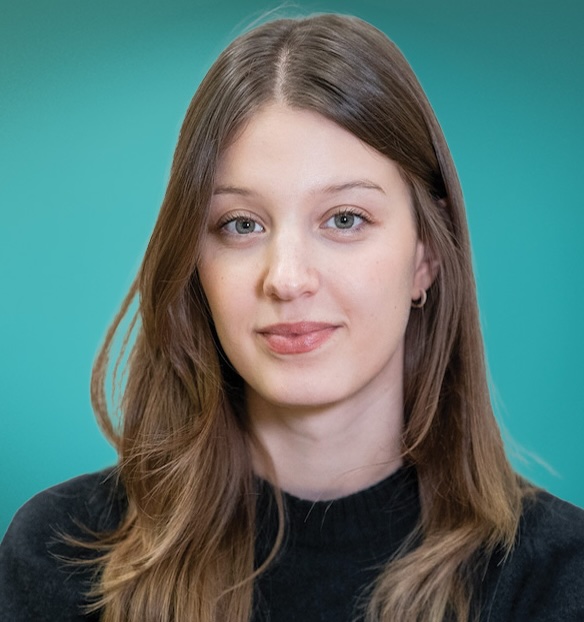 Anastasija Pešić pursued her mathematics studies at the University of Belgrade, Serbia, and continued her studies in Germany as a member of the Berlin Mathematical School (BMS), the Graduate School of MATH+. She completed her M.Sc. at Humboldt-Universität zu Berlin in 2021 with the thesis on “Variational Analysis and Large Deviations Principle for Membrane Models.” In 2021, Anastasija was awarded the Hilda Geiringer Scholarship of the BMS, which aims to support promising female PhD students in mathematical research and recognize outstanding potential. At the DMV Student’s Conference in 2022, she also won the prize for the best conference talk. Currently, Anastasija Pešić is pursuing her Ph.D. at the Humboldt Universität zu Berlin in the Department of Applied Analysis, supervised by MATH+ member Barbara Zwicknagl. Her research project is part of RTG DAEDALUS. Each year, for a duration of three years, up to ten new GAMM Juniors are selected. During their time as GAMM Juniors, the GAMM membership fees are waived. After three years, the membership as GAMM Junior is terminated automatically. By this means, it is guaranteed that young researchers obtain additional financial and emotional support at the start of their academic research, that they transfer their knowledge to the next generations of GAMM Juniors, and that they pass the organization of the group onto them. MATH+/BMS Dirichlet Postdocs 2023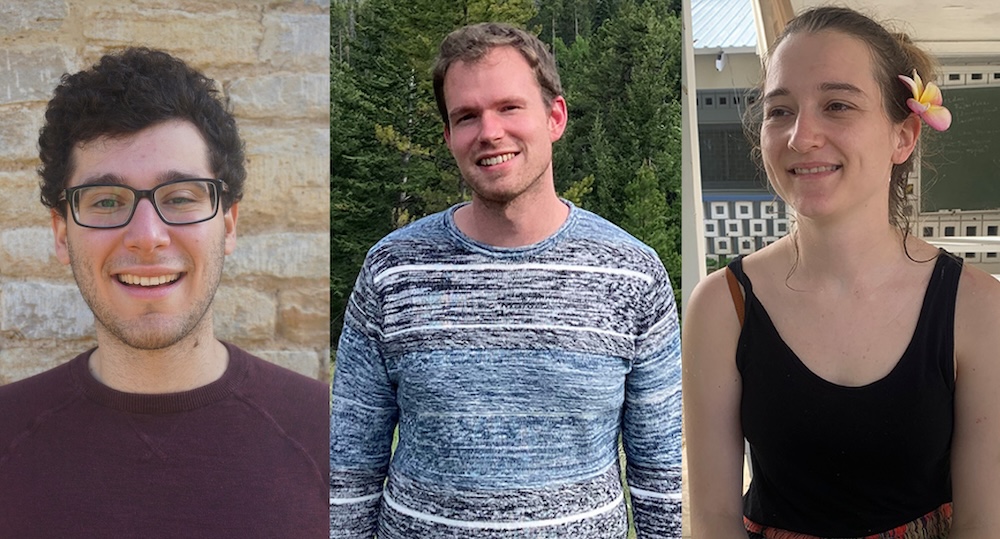 Ioannis Papadopoulos, Fabian Lehman, and Alexandra Wesolek | Photos: private
The Dirichlet Postdoctoral Fellows pursue their research agendas and delve into their individual research interests. MATH+ and the BMS offer an extensive mathematical environment and access to the latest advancements in their respective fields. They will receive support in establishing a collaborative network, encompassing both national and international scientific contacts, and benefit from insights provided by research groups in related or diverse fields. Furthermore, the postdoctoral researchers will have abundant opportunities to acquire teaching, supervisory, and mentoring experience within the framework of the BMS and MATH+. Fabian Lehmann @ HU Berlin: Fabian Lehmann studied mathematics at the Universität Freiburg. He earned his PhD from University College London with a dissertation on “Families of complete non-compact Spin (7) holonomy manifolds” in 2020. In the past three years, he worked at the Simons Center for Geometry and Physics in Stony Brook, New York. His research interests are at the intersection of geometry and partial differential equations. An essential system of partial differential equations appearing in geometry is Einstein’s equations, which characterize spaces with a particularly interesting curvature. They also appear in the theory of general relativity. He studies these equations on octonionic spaces, which have dimension seven or eight and are modeled on the octonions, which form an eight-dimensional number system. This extra structure gives Einstein’s equations a simpler form. Even in this setting, finding solutions is challenging. Fabian hopes that his “research at the BMS can contribute to finding such spaces which look like a cone” and continues with regard to MATH+ and the BMS: “The BMS has been a very successful program so far, and I am honored to be part of it.” Ioannis Papadopoulos @ WIAS: Ioannis Papadopoulos studied mathematics at the Imperial College London (B.Sc.) and the University of Oxford (M.Sc.). He obtained his PhD from the University of Oxford with a thesis on “Computing multiple solutions of topology optimization problems” in 2021. From 2021 to 2023, he held a research associate (postdoc) position at Imperial College London. His main research area is numerical analysis and scientific computing. The research focuses on the interface between PDEs and numerical analysis: spectral and finite element methods for fractional and nonlinear PDEs, nonconvex optimization, preconditioners, and software. During his Dirichlet postdoctoral fellowship, Ioannis wants to explore nonconvex PDE-constrained optimization, sparse hp-finite element methods, and preconditioning techniques for nonlinear PDEs and (quasi) variational inequalities. In particular, he is interested in computing multiple solutions of highly nonlinear problems with sparse high order discretizations. About his upcoming years in Berlin as a Dirichlet postdoc, he said: “It brings me great joy to become a part of the esteemed MATH+/BMS community. I eagerly anticipate engaging in collaborations and embracing what Berlin has to offer.” Alexandra Wesolek @ TU Berlin: Alexandra Wesolek recently completed her PhD at the Simon Fraser University in Vancouver under the guidance of Bojan Mohar. Her primary research focus lies in topological graph theory. This subject is at the intersection of graph theory and topology/geometry. Throughout her graduate studies, Alexandra also went on research visits to France, where she worked on structural graph theory. Prior to joining the BMS, she pursued a 3-month postdoctoral position in Lyon, France, under the mentorship of Nicolas Bousquet and Théo Pierron. During her time at MATH+ and the BMS, she wants to work further on geometric and structural problems in graph theory. A problem she finds particularly engaging is the cops and robber game. In this game, cops try to catch one robber, while the cops and the robber move at the same speed. The game field can either be a graph or a surface. One is generally interested in the minimum number of cops that can catch the robber on the game field. Played on a graph, the game has many connections to structural graph theory since the structure of a graph determines the game. However, when played on surfaces, the game is influenced by the geometry of the surface. Regarding her forthcoming years at the BMS in Berlin, she commented: “Being at the BMS and working in the group of Stefan Felsner was my favorite destination for a postdoc, so I was very excited when I got the Dirichlet Postdoctoral Position. I am looking forward to being part of the BMS and to interacting with the students in the program and other postdocs. I am planning to teach a specialized BMS course in graph theory next year, which I am particularly looking forward to.” BMS/MATH+ Orientation for New Students & Postdocs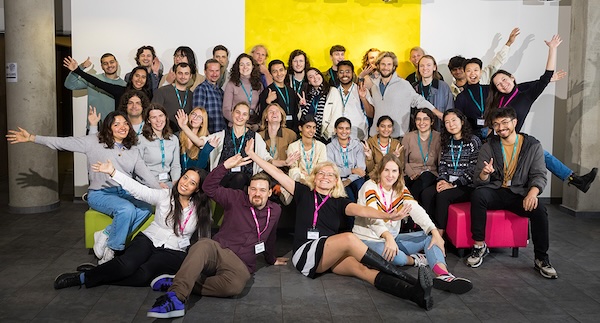 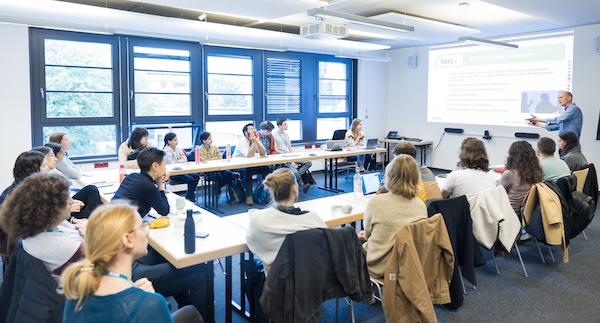 Photos: © Kay Herschelmann / MATH+ On 10 October, we welcomed all new students for the BMS Orientation Day. The BMS Chair, Holger Reich, informed the Phase I students about all relevant aspects of the BMS PhD program, such as Basic and Advanced Courses, the Qualifying Exam, the MATH+ Friday Colloquia, and the BMS Mentoring program. Soft-Skills Seminars were introduced, and funding opportunities for conferences, summer schools, and German language courses explained. The MATH+ Managing Director, Nadja Wisniewski, and our Gender and Diversity Manager, Tanja Fagel, introduced the new Phase II students of the relevant details. The BMS Coordinator, Annika Preuß-Vermeulen, gave a talk on Mental Health and where to find help in case of need for Phase I students in the morning and for the junior researchers (incl. Postdocs and Junior Research Group leaders) in the afternoon. The lunch break brought all newcomers and experienced BMS students and alumni together and gave everyone a chance to get to know each other and share tips in a relaxed atmosphere. For the new Phase I students the day was concluded with presentations of the Basic Courses offered this semester, while the Phase II students and Postdocs heard a talk on Research Data Management by Tim Hasler, MATH+ Chief Data Officer. The Postdoc Orientation in the late afternoon started with a warm welcome by MATH+ Co-Chair, Martin Skutella, who together with the Postdoc Liaison Officer, Theo Roelofs, provided the new researchers with targeted information on opportunities and services at MATH+. This included such pressing topics as career development and its strategies, how to gain teaching experience, and the importance of becoming a mentor as well as finding a mentor for themselves. Funding opportunities and services at MATH+, service information about graduate services at FU, HU and TU and the BUA Postdoc Academy, and instructions on MATh+ publications were also explained. The orientation session ended with introducing the MATH+ Postdoc Representatives at MATH+ who participate in MATH+ Board and BMS Committee meetings. The BMS Orientation week also encompassed many other helpful and also fun activities to prepare the students for studying and living in Germany and Berlin, like an Intercultural Training, a Master Regulations Meeting, and Campus Tours with the Student Representatives. A Walking Tour through Berlin and a food tour organized by the Student Representatives concluded the program. We hope all groups took advantage of the valuable pieces of information and networking opportunity and had a great start at the BMS/MATH+. We look forward to seeing everyone again at the many BMS/MATH+ activities. LINKS: MATH+/BMS Welcomes the First YAM FellowsWe are delighted to introduce Samantha Glory Guiate Simo and Wilson Tsuata as our first MATH+ YAM Fellows of the Young African Mathematicians (YAM) Fellowship Program for the academic year 2023/24. They just arrived and will stay in Berlin until 30 June 2024. As YAM fellows, they are also a part of the Berlin Mathematical School (BMS) for the duration of the YAM program. Congratulations, and welcome to the MATH+/BMS community! — About the YAM Fellowship Program: The Young African Mathematicians (YAM) Fellowship Program is a collaboration between five of the African Institutes for Mathematical Science (AIMS) and four German Clusters of Excellence: Hausdorff Center for Mathematics (Universität Bonn), Münster Mathematics (Universität Münster), STRUCTURES (Universität Heidelberg), and MATH+ (Berlin). The YAM program welcomes talented African students in mathematics to join one of the four clusters for nine months. They can take courses and seminars and gain experience in working on research projects. |


















